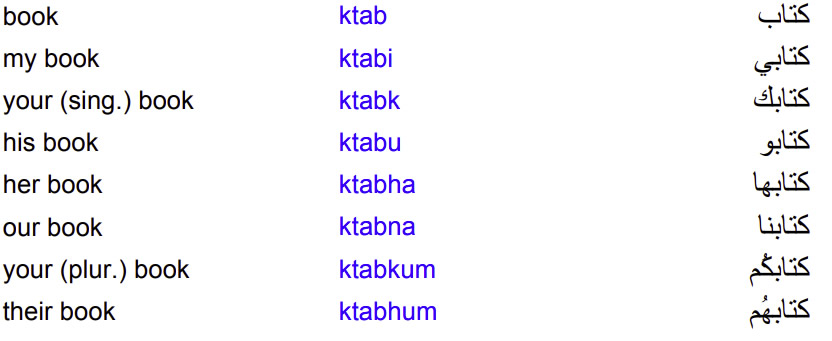Difference between revisions of "Language/Moroccan-arabic/Grammar/Possessive-Pronouns"
< Language | Moroccan-arabic | Grammar
Jump to navigation
Jump to search
m (Quick edit) |
m (Quick edit) |
||
| Line 28: | Line 28: | ||
* [[Language/Moroccan-arabic/Grammar/The-Nominative-Case-in-Moroccan-Arabic|The Nominative Case in Moroccan Arabic]] | * [[Language/Moroccan-arabic/Grammar/The-Nominative-Case-in-Moroccan-Arabic|The Nominative Case in Moroccan Arabic]] | ||
* [[Language/Moroccan-arabic/Grammar/How-to-use-“there-to-be”-in-Moroccan-Arabic|How to use “there to be” in Moroccan Arabic]] | * [[Language/Moroccan-arabic/Grammar/How-to-use-“there-to-be”-in-Moroccan-Arabic|How to use “there to be” in Moroccan Arabic]] | ||
{{Moroccan-arabic-0-to-A1-Course-TOC}} | |||
[[Category:Course]] | |||
[[Category:Moroccan-arabic-Course]] | |||
[[Category:0-to-A1-Course]] | |||
[[Category:Moroccan-arabic-0-to-A1-Course]] | |||
Revision as of 21:35, 11 March 2023
Possessive Pronouns in Moroccan Arabic
In Darija, a suffix (ending) may be added to the end of words in order to express possession.
Possessive Pronouns
* For the “my” and “his” forms, the first ending is used for words ending in consonants, while the second is used with words ending in vowels. For example, smiti (my name), but xuya (my brother).
Example of possessive pronouns with the noun “book.”
Sources
https://fsi-languages.yojik.eu/languages/PeaceCorps/Arabic-Moroccan/MO_Arabic_Language_Lessons.pdf


